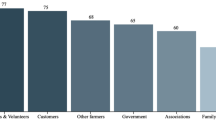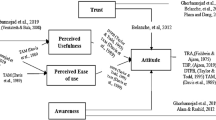Abstract
Sub-Saharan African economies depend heavily on agriculture. Seed from improved varieties and other inputs are imperative to the transformation of the agricultural sector from subsistence farming to small-scale commercial agriculture and thus to increasing food security on the continent. Farmers make the decision to adopt seed from improved varieties based on a number of seed attributes. These range from tangible attributes such as input costs and yield to intangible attributes such as trust in seed from improved varieties. In the course of adoption decisions, social dynamics involving trust can over-ride objective evaluations of tangible attributes. This makes it difficult to design sustainable adoption policies in an intuitive way. For this purpose we develop a system dynamics model and combine it with conjoint analysis. Conjoint analysis allows us to elicit smallholder farmers’ choice preferences in detail and to add precision to the structure of the model. The simulation framework helps to improve our understanding concerning the dynamic implications of accumulation processes relating to trust and skill. We test this approach with empirical data for maize in Malawi. Model simulations demonstrate that effective adoption stimulation policies should focus on measures that build trust in improved maize varieties instead of increasing their potential yield even further and in this way contribute to food security.
This article has previously been published as: Kopainsky, B., Tröger, K., Derwisch, S., & Ulli-Beer, S. (2012). Designing Sustainable Food Security Policies in Sub-Saharan African Countries: How Social Dynamics Over-Ride Utility Evaluations for Good and Bad. Systems Research and Behavioral Science, 29(6), 575–589. doi:10.1002/sres.2140
Access this chapter
Tax calculation will be finalised at checkout
Purchases are for personal use only
Similar content being viewed by others
Notes
- 1.
For a historical overview of food security policies in Malawi see Harrigan (2008).
References
Abadi Ghadim AK, Pannell DJ (1999) A conceptual framework of adoption of an agricultural innovation. Agric Econ 21(2):145–154
Benson T (1999) Area-specific fertilizer recommendations for hybrid maize seed grown by Malawian smallholders. A manual for field assistants. http://www.cabi.org/GARA/FullTextPDF/2008/20083326757.pdf. Retrieved 25 Nov 2011
Boko M, Niang I et al (2007) Africa. In: Parry ML, Canziani OF, Palutikof JP, van der Linden PJ, Hanson CE (eds) Climate change 2007: impacts, adaptation and vulnerability. contribution of working group II to the fourth assessment report of the intergovernmental panel on climate change. Cambridge University Press, Cambridge, UK, pp 433–467
Cialdini RB, Reno RR et al (1990) A focus theory of normative conduct: recycling the concept of norms to reduce littering in public places. J Pers Soc Psychol 58(6):1015–1026
Dattée B, Weil HB (2007) Dynamics of social factors in technological substitutions. Technol Forecast Soc Change 74(5):579–607
FAO (2010) “Climate-smart” agriculture. Policies, practices and financing for food security, adaptation and mitigation. http://www.caadp.net/pdf/Climate-Smart%20Agriculture%20FAO%20Report.pdf. Retrieved 25 Nov 2011
Forrester JW (1961) Industrial dynamics. MIT Press, Cambridge, MA
Foster AD, Rosenzweig MR (1995) Learning by doing and learning from others: human capital and technological change in agriculture. J Political Econ 103(6):1176–1209
Gilbert RA, Komwa MK et al (2002) A Comparison of best-bet soil fertility technologies for maize grown by Malawian smallholders. A research report of the results of the nationwide 1998/99 and 1999/2000 on-farm cropping system verification trial. Chitedze Agricultural Research Station, Lilongwe
Green PE, Krieger AM et al (2001) Thirty years of conjoint analysis: reflections and prospects. Interfaces 31(3):S56–S73
Hair JF, Black WC et al (2010) Multivariate data analysis. Prentice Hall, Upper Saddle River
Harrigan J (2008) Food insecurity, poverty and the Malawian Starter Pack: fresh start or false start? Food Policy 33(3):237–249
Heisey PW, Morris ML et al (1998) Economics of hybrid maize adoption. In: Morris ML (ed) Maize seed industries in developing countries. Lynne Rienner, Boulder, pp 143–158
Johnson C, Dowd TJ et al (2006) Legitimacy as social process. Ann Rev Sociol 32:53–78
Kallgren CA, Reno RR et al (2000) A focus theory of normative conduct: when norms do and do not affect behavior. Pers Soc Psychol Bull 26(8):1002–1012
Kopainsky B, Derwisch S (2009) Model-based exploration of strategies for fostering adoption of improved seed in West Africa. In: Proceedings 27th international conference of the system dynamics society, Albuquerque
Lancaster KJ (1966) A new approach to consumer theory. J Political Econ 74(2):132–157
Latané B (1981) The psychology of social impact. Am Psychol 36(4):343–356
Lobell DB, Burke MB et al (2008) Prioritizing climate change adaptation needs for food security in 2030. Science 319(1):607–610
Maredia MJ, Howard et al (1999) Increasing seed system efficiency in Africa: concepts, strategies and issues. MSU international development working paper. http://purl.umn.edu/54578. Retrieved 25 Nov 2011
Marra M, Pannell DJ et al (2003) The economics of risk, uncertainty and learning in the adoption of new agricultural technologies: where are we on the learning curve? Agr Syst 75(2–3):215–234
Milling PM (1996) Modeling innovation processes for decision support and management simulation. Syst Dyn Rev 12(3):211–234
Milling PM (2002) Understanding and managing innovation processes. Syst Dyn Rev 18(1):73–86
MOAFS (2008) 2007/2008 annual agricultural statistical bulletin. Ministry of Agriculture and Food Security Malawi, Lilongwe
MOAFS (2010) National crop estimates 2009/2010. http://www.moafsmw.org/ocean/docs/Recent%20Information/2009_2010%203rd%20Round%20Crop%20Estimates%20Figures.pdf. Retrieved 26 Jan 2011
Morris ML, Tripp R et al (1999) Adoption and impacts of improved maize production technology: a case study of the Ghana Grains Development Project. Econ Progr Pap. http://ageconsearch.umn.edu/bitstream/48767/2/ep99mo01.pdf. Retrieved 25 Nov 2011
Munshi K (2004) Social learning in a heterogeneous population: technology diffusion in the Indian Green Revolution. J Dev Econ 73(1):185–213
Philips F (2007) On S-curves and tipping points. Technol Forecast Soc Change 74(6):715–730
Rogers E (2003) Diffusion of innovations. Free Press, New York
Shelling TC (1971) Dynamic models of segregation. J Math Soc 1:143–186
Sterman JD (1984) Appropriate summary statistics for evaluating the historical fit of system dynamics models. Dynamica 10(2):51–66
Stone GD (2007) Agricultural deskilling and the spread of genetically modified cotton in Warangal. Curr Anthropol 48(1):67–87
Struben J, Sterman JD (2008) Transition challenges for alternative fuel vehicle and transportation systems. Environ Plann B Plann Des 35(6):1070–1097
Sunding D, Zilberman D (2001) The agricultural innovation process: research and technology adoption in a changing agricultural sector. In: Gardner BL, Rausser GC (eds) Handbook of agricultural and resource economics. North Holland, Amsterdam, pp 207–261
Ulli-Beer S (2004) Citizens’ choice and public policy. A system dynamics model for recycling management at the local level. Shaker Verlag, Aachen
Ulli-Beer S, Gassmann F et al (2010) Generic structure to simulate acceptance dynamics. Syst Dyn Rev 26(2):89–116
Witcombe JR, Petre R et al (1999) Farmer participatory crop improvement. IV. The spread and impact of a rice variety identified by participatory varietal selection. Exp Agric 35:471–487
Acknowledgements
We would like to thank the German Development Agency GTZ for financial support of KT as a CAS-IP intern and the International Crop Research Institute for the Semi-Arid Tropics ICRISAT for financial and logistical support in Malawi. The paper benefitted from comments by and the general support of Dr. Victoria Henson-Apollonio. BK was supported by the Swiss National Science Foundation under a Fellowship for Advanced Researchers. The views and conclusions expressed in this paper are those of the authors alone and do not necessarily reflect the views of the Swiss National Science Foundation.
Author information
Authors and Affiliations
Corresponding author
Editor information
Editors and Affiliations
Rights and permissions
Copyright information
© 2013 Springer-Verlag Berlin Heidelberg
About this chapter
Cite this chapter
Kopainsky, B., Tröger, K., Derwisch, S., Ulli-Beer, S. (2013). Social Dynamics Overriding Utility Evaluations for Good and Bad: Implications for the Design of Sustainable Food Security Policies in Sub-Saharan African Countries. In: Ulli-Beer, S. (eds) Dynamic Governance of Energy Technology Change. Sustainability and Innovation. Springer, Berlin, Heidelberg. https://doi.org/10.1007/978-3-642-39753-0_9
Download citation
DOI: https://doi.org/10.1007/978-3-642-39753-0_9
Published:
Publisher Name: Springer, Berlin, Heidelberg
Print ISBN: 978-3-642-39752-3
Online ISBN: 978-3-642-39753-0
eBook Packages: Business and EconomicsEconomics and Finance (R0)




